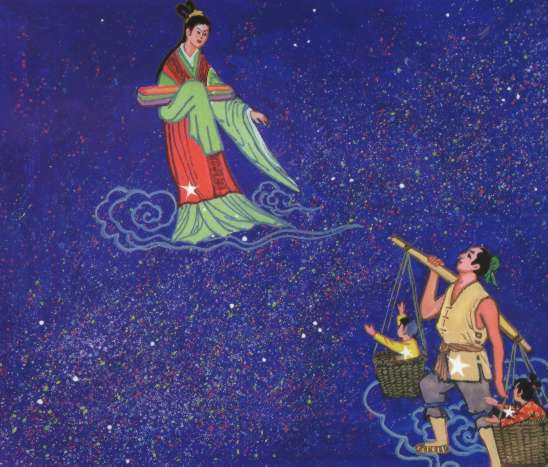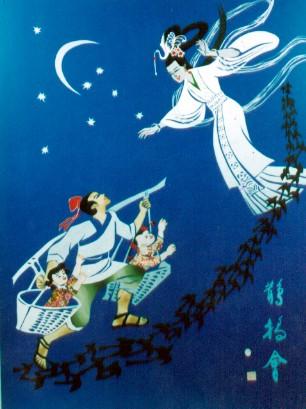[Disclaim: Some text here are cited from Wikipedia under the GNU Document Licence]
Qi Xi (七夕; Pinyin: qī xī; “The Night of Sevens”) is Chinese Valentine’s Day (sometimes called Magpie Festival) It’s on the seventh day of the seventh lunar month on the Chinese calendar; thus its name. In 2007, this festival falls today, August 19.
There is a very romatic story of Cowherd and Weaver Girl. As in late summer, the stars Altair and Vega are high in the night sky, our ancestors observed that and a love story came out.
A young cowherd named Niulang (Chinese: 牛郎; Pinyin: niú láng, “the cowherd”, the star Altair) happens across seven fairy sisters bathing in a lake. Encouraged by his mischievous companion the ox, he steals their clothes and waits to see what will happen. The fairy sisters elect the youngest and most beautiful sister Zhinü (Simplified Chinese: 织女; Traditional Chinese: 織女; Pinyin: zhī nǚ, “the weaver girl”, the star Vega) to retrieve their clothing. She does so, but since Niulang has seen her naked, she must agree to his request for marriage. She proves to be a wonderful wife, and Niulang a good husband, and they are very happy together. But the Goddess of Heaven (in some versions Zhinü’s mother) finds out that a mere mortal has married one of the fairy girls and is furious. (In another version, the Goddess forced the weaver fairy back to her former duty of weaving colorful clouds in the sky because she could not do her job while married to the mortal.) Taking out her hairpin, the Goddess scratches a wide river in the sky to separate the two lovers forever (thus forming the Milky Way, which separates Altair and Vega).
Zhinü must sit forever on one side of the river, sadly weaving on her loom, while Niulang watches her from afar and takes care of their two children (his flanking stars β and γ Aquilae).
But once a year all the magpies in the world take pity on them and fly up into heaven to form a bridge (鵲橋, “the bridge of magpies”, Que Qiao) over the star Deneb in the Cygnus constellation so the lovers may be together for a single night, the seventh night of the seventh moon.
There are also lots of traditions, but now in China, we usually treat Qi Xi as the second Valentine’s Day in a year. We also have many beautiful poems about Qi Xi, one of my favourite is:
秋夕 –(唐)杜牧
红烛秋光冷画屏,
轻罗小扇扑流萤。
天阶夜色凉如水,
坐看牵牛织女星。
Translated as:
The painted screen is chilled in silver candlelight,
She uses silken fan to catch passing fireflies.
The steps seem steeped in water when cold grows the night,
She lies watching heart-broken stars shed tears in the skies.
I am not so that sad, of course ;)

